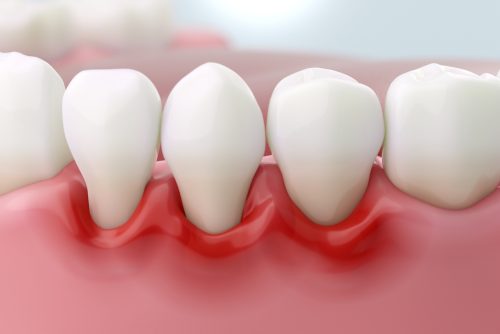Gum Disease Prevention Strategies from San Clemente’s Leading Periodontist
Maintaining exemplary oral health is a cornerstone of overall wellness, with healthy gums serving as the foundation for a vibrant smile. Keeping your gums healthy is essential to prevent periodontal disease, commonly known as gum disease, which is a pervasive condition that stems from the accumulation of plaque and harmful bacteria on teeth and gums. This buildup can trigger inflammation, infection, and potential damage to the crucial structures supporting your teeth.
When left unchecked, periodontal disease can have far-reaching consequences beyond oral health, potentially leading to tooth and bone loss, systemic infections, and other serious health complications. Understanding the nuances of gum disease – its signs, causes, and treatment options – is paramount for preserving your dental health and maintaining a confident smile.
At Wright Perio & Implants, our esteemed San Clemente periodontist, Dr. Raymond L. Wright Jr., is dedicated to ensuring your oral health reaches and maintains its optimal state. To embark on your journey towards better gum health, schedule a consultation at our South Orange County, CA, dental practice today by calling (949) 361-4867.
Understanding Gum Disease
What is Gum Disease?
Gum disease, also known as periodontal disease, is a chronic bacterial infection that targets the gums and the bone supporting your teeth. This common condition can lead to inflammation, infection, and significant damage to the gums and bones if left untreated. The primary culprit behind gum disease is plaque—a sticky film of bacteria that forms on your teeth and along the gumline. If not adequately removed through regular brushing and flossing, plaque can harden into tartar, which requires professional dental intervention to eliminate.
Signs and Symptoms of Gum Disease
Recognizing the signs and symptoms of gum disease is crucial for early intervention and effective treatment. Common indicators include:
- Red, swollen, or bleeding gums: These are often the first signs of gum disease, indicating inflammation and infection.
- Bad breath: Persistent bad breath can be a sign of bacterial buildup in the mouth.
- Loose teeth: As the disease progresses, it can weaken the structures supporting your teeth, leading to mobility.
- Changes in bite: Alterations in the way your teeth fit together when you bite can signal advanced gum disease.
- Pus between teeth and gums: This is a clear sign of infection that requires immediate attention.
- Receding gums: Gums that pull away from the teeth can expose the roots, increasing sensitivity and risk of decay.
- Sensitive teeth: Increased sensitivity can result from receding gums and exposed tooth roots.
It’s important to note that gum disease can progress slowly, and some individuals may not experience noticeable symptoms until the condition has advanced. Regular dental checkups are essential for early detection and management.
Understanding the Root Causes of Gum Disease
Gum disease can arise from various factors, including:
- Inadequate oral hygiene practices, such as inconsistent brushing and flossing
- Tobacco use, encompassing both smoking and smokeless tobacco products
- Genetic predisposition and family history of periodontal issues
- Hormonal fluctuations, particularly during pregnancy, menopause, or puberty
- Side effects from certain medications, including some blood pressure regulators, antihistamines, and antidepressants
- Compromised immune system due to health conditions like diabetes or HIV/AIDS
- Nutritional deficiencies or imbalances
- Natural aging processes
- Chronic teeth grinding (bruxism) and jaw clenching
Ongoing research into the risk factors for gum disease has identified specific associations between gum disease and certain characteristics or factors.
The Importance of Oral Health
Link to Overall Health and Well-being
Oral health is intricately linked to your overall health and well-being. Research has established a strong connection between gum disease and various systemic health conditions, including:
- Coronary artery disease: Inflammation from gum disease can contribute to heart disease.
- Diabetes: Gum disease can make it more difficult to control blood sugar levels.
- Respiratory disease: Bacteria from the mouth can be inhaled into the lungs, leading to respiratory infections.
- Rheumatoid arthritis: Chronic inflammation from gum disease may exacerbate arthritis symptoms.
- Preterm birth and low birth weight: Pregnant women with gum disease are at higher risk of these complications.
Additionally, gum disease has been linked to an increased risk of tooth decay, loose or sensitive teeth, and other oral health issues. Studies have also shown that individuals with gum disease are more likely to experience cognitive decline and dementia.
Maintaining good oral hygiene habits—such as regular brushing, flossing, and dental checkups—is crucial for preventing gum disease and promoting overall health. By taking care of your teeth and gums, you can significantly reduce your risk of developing gum disease and its associated health conditions.
Proven Strategies for Gum Disease Prevention
Elevate Your Oral Health and Hygiene Routine
The cornerstone of gum disease prevention lies in maintaining impeccable oral hygiene. This encompasses brushing your teeth thoroughly at least twice daily with fluoride-rich toothpaste, daily flossing, and incorporating an antimicrobial mouthwash into your regimen. Additionally, scheduling biannual visits to Wright Perio & Implants for comprehensive checkups and professional cleanings is crucial for maintaining good oral hygiene and optimal gum health.
Embrace a Tobacco-Free Lifestyle
Tobacco use significantly elevates your risk of developing gum disease. By quitting smoking or using smokeless tobacco products, you can dramatically improve your oral health prospects. Tobacco cessation not only strengthens your immune system but also enhances your body’s ability to combat gum infections effectively.
Moderate Sugar Consumption
A diet high in sugary foods and beverages can exacerbate your risk of periodontal disease. Sugar serves as a primary food source for harmful oral bacteria, facilitating the formation of dental plaque and tartar. To safeguard your gum health, consider reducing your intake of sugary items and opting for nutrient-rich alternatives such as fresh fruits, vegetables, and whole grains.
Prioritize Regular Dental Visits
Consistent dental examinations and cleanings play a pivotal role in preventing gum disease. Dr. Wright and our team at Wright Perio & Implants possess the skill to identify early warning signs of periodontal issues and implement prompt treatment strategies before the condition escalates. Our advanced dental cleaning techniques effectively remove tartar and plaque buildup that cannot be addressed through regular home care alone.
Explore Preventive Treatments
For individuals at elevated risk of developing periodontal disease, Dr. Wright may recommend targeted preventive treatments. These may include more frequent professional dental cleanings, scaling and root planing procedures, or cutting-edge antibiotic therapies tailored to your specific needs.
Incorporate Water Flossing
A water flosser, also known as an oral irrigator, utilizes a concentrated stream of water to cleanse between teeth and along the gumline. This innovative tool can be particularly beneficial for patients who find traditional flossing challenging. Regular use of a water flosser can significantly reduce plaque accumulation, minimize tooth decay risk, and mitigate other factors contributing to gum disease.
Implement Stress Management Techniques
Chronic stress can compromise your immune system, diminishing your body’s capacity to ward off infections, including those affecting your gums. To bolster your defense against gum disease, consider incorporating stress-reduction practices such as mindfulness meditation, progressive muscle relaxation, or regular physical exercise into your daily routine.
The Perioscope
While not a preventive technique, the perioscope is an endoscope that has been specifically designed to explore and visualize the pocket (space) under the gum of teeth involved with periodontal disease. An image on a computer monitor shows the diseased tooth’s root surface. The perioscope enables our clinician, Dr. Wright, to see the contents of the periodontal pocket and to analyze the root surface of the tooth for periodontal disease, causing bacterial accumulations (plaque and calculus).
The perioscope guides Dr. Wright during the process of cleaning the root surface free of plaque and calculus – the treatment for periodontal disease. It also allows him to identify other problems (cracks, perforations, and other disease-causing flaws of the tooth root’s surface) that are located under the gum – previously requiring surgery to detect.
Frequently Asked Questions
Indeed, overzealous brushing or using a toothbrush with hard bristles can potentially damage gum tissue and lead to gum recession. This damage can also increase your susceptibility to gum disease. Dr. Wright recommends using a soft-bristled toothbrush and employing gentle, circular motions when brushing to protect your gum health.
While no home remedy can single-handedly cure gum disease, several practices can complement professional treatment and help manage the condition:
- Maintain rigorous oral hygiene habits, including twice-daily brushing with fluoride toothpaste, daily flossing, and using antibacterial mouthwash.
- Adopt a balanced diet rich in vitamins C and D, which support gum health.
- Consider oil pulling with coconut oil, which may help reduce plaque buildup.
- Use a saltwater rinse to soothe inflamed gums and promote healing.
It’s crucial to note that these measures should be used in conjunction with professional periodontal care, not as a substitute for it.
While mouthwash can be a valuable addition to your oral care regimen, it should not be relied upon as the sole method for preventing gum disease. Antimicrobial mouthwashes can help reduce bacteria and freshen breath, but they are most effective when used in combination with thorough brushing and flossing. Dr. Wright can recommend a mouthwash that best suits your individual needs and complements your overall periodontal health plan.
Safeguard Your Smile with Proper Periodontal Care, Call Now!
At Wright Perio & Implants in San Clemente, CA, Dr. Raymond L. Wright Jr. and our dedicated team are committed to providing state-of-the-art periodontal care tailored to your unique needs. Whether you’re seeking preventive strategies or require treatment for existing gum issues, we’re here to guide you toward optimal oral health.
Don’t let gum disease compromise your smile or overall well-being. Contact Wright Perio & Implants today at (949) 361-4867 to schedule a comprehensive periodontal consultation. Our experience extends beyond San Clemente to serve patients from surrounding communities, including Irvine, Laguna Niguel, San Juan Capistrano, and Mission Viejo. Take the first step towards a healthier, more confident smile – your gums will thank you for years to come.
